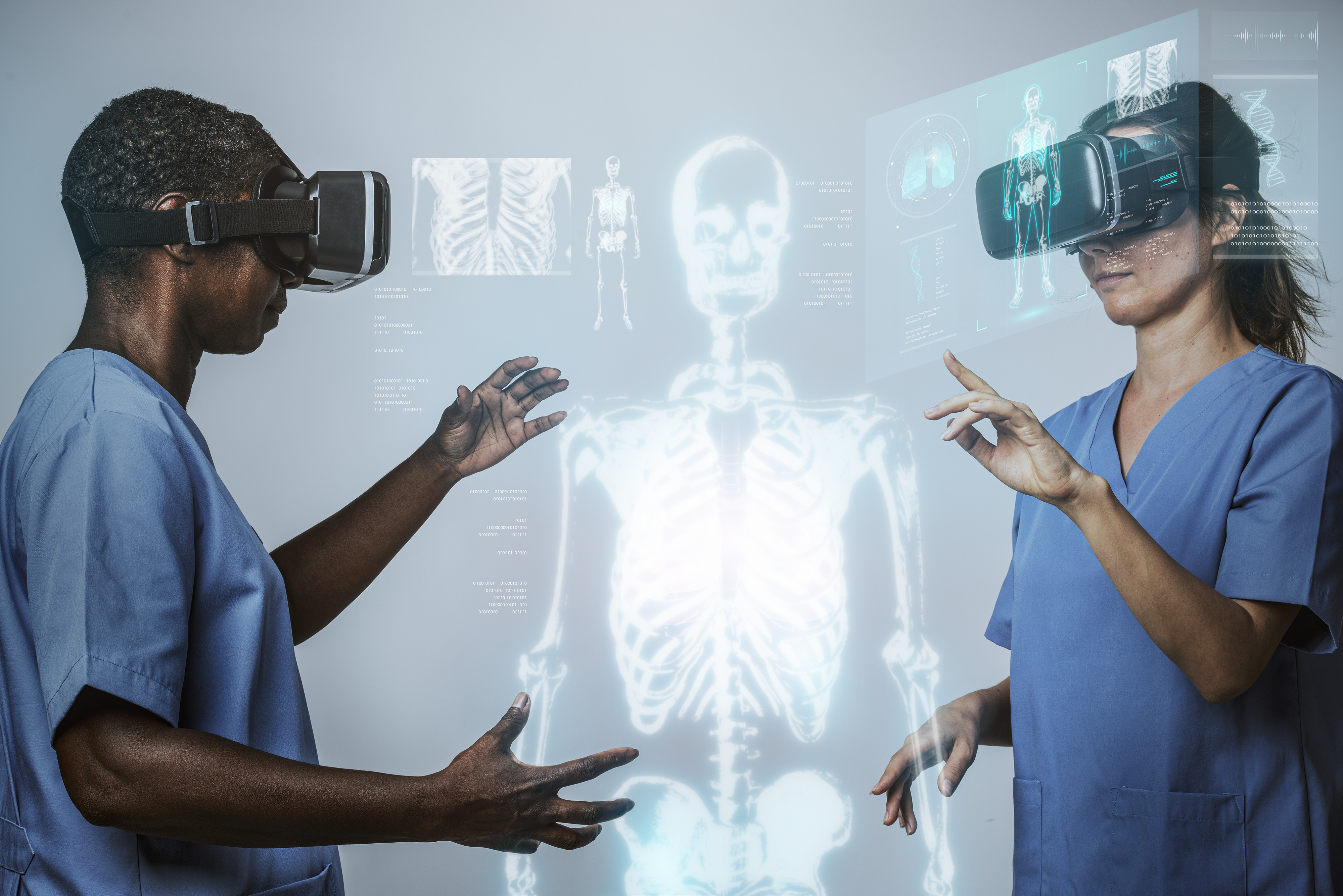Health data is transformed into significant insights using Artificial Intelligence (AI)

Health data is transformed into significant insights using Artificial Intelligence (AI)
Artificial intelligence (AI) has changed the digital health world in the last several years. The transformation is not just occurring in some industries; the healthcare sector has also benefited from this brilliant revolution and has adjusted by becoming “AI-enabled health-tech.” Healthcare operations and delivery have benefited from AI in various ways, including but not limited to handling medical records, real-time clinical data transmission and analysis, m-consultations, and preventative healthcare.
Medical equipment using artificial intelligence
Artificial intelligence may replicate cognitive human intellect and behaviour when appropriately used in medical equipment. Neural networks, a set of algorithms modelled after human intelligence, are used to endow modern medical gadgets with this intelligence. A critical factor in the healthcare sector’s ability to embrace the digital revolution is the integration of electronic health records into digital forms, thanks to AI and ML. Additionally, “intelligent” gadgets with AI capabilities advance several medical sciences, including telemedicine, preventative healthcare, medical therapy optimization, diagnostic assistance, and more.
AI’s function in pattern recognition
Since the pandemic, preventative healthcare has received more attention, which has boosted the popularity of the Internet of Medical Things (IoMT). As a result, medical gadgets that measure blood pressure, oxygen saturation, blood sugar, heart rate, and physical activity have become widespread. Unfortunately, these intelligent gadgets produce a lot of complex data to extract and analyze.
To analyze these massive data sets, identify trends, and even forecast future risk factors and pandemic breakouts, AI techniques are essential. Additionally, they may calculate hospitalization rates and assess readiness measures for such events. The public healthcare system is being improved with cognitive machine learning technology.
Clinical applications supported by AI.
In identifying possible risk indicators that might assist in prompt action before a patient’s condition becomes severe, AI has demonstrated promising and highly accurate outcomes, consequently lowering the mortality rate.
By analyzing massive amounts of health information using neural networks, cardiovascular symptoms, including heart attacks, myocardial dysfunction, and coronary artery disorders (CAD), are anticipated. AI-guided ECGs, for instance, can identify abnormal cardiac rhythms (such as atrial fibrillation) even before symptoms show up. This enables early intervention, such as modifying one’s lifestyle and receiving customized medicine, to help prevent heart damage.
Genomics, or genome study, is an essential field of medical research where AI has made substantial contributions. Analysis of the DNA’s three-dimensional, hierarchical structure is one of the areas covered by this discipline. By detecting gene abnormalities, the study aids in early illness identification even before symptoms are visible. An emerging field of medicine called genomic medicine can help with everything from oncology treatment planning to diagnostic procedures like cancer screening.
Other clinical fields, including dermatology, gastrointestinal, pathology, and radiology, are among the many areas AI widely uses.
AI use in the pharmaceutical sector

The pandemic has provided the pharmaceutical business with a lesson on how to embrace digital change and quickly use AI to provide trustworthy and secure medications to end users. Because of the successful integration of this technology into research and development (R&D), drug discovery, clinical trials, and manufacturing scale-up, the industry has seen remarkable outcomes.
This innovative technology has impressive speed and agility. It took eight to ten years before the pandemic to discover the coronavirus genome and suggest the first vaccine, but it took 300 days. Due to the accurate outcomes of the cutting-edge technology, all additional procedures like clinical trials and FDA clearances might be accelerated.
Will AI also replace creative jobs?
The capacity of robots to carry out certain activities that traditionally require human intelligence is known as artificial intelligence, or AI. It enables the machines to comprehend and accomplish particular objectives. Said, robots autonomously learn from existing data without human assistance.
Through deep learning, computers can process enormous volumes of unstructured data, including text, pictures, and audio. Four different forms of artificial intelligence exist:
- Reactive Machines
- Limited Memory
- Theory of Mind
- Self- Awareness
Almost every aspect of our daily lives today is influenced by Artificial Intelligence.
- Siri, Alexa, and other smart assistants
- Self-driving cars
- Robo-advisors
- Conversational bots
- Smart Email Apps
- Search and Recommend Algorithms
- E-Payments
- OTT recommendations
- Social Media
- Music Streaming Services
- Google Maps and Navigation
- Text Editors and Autocorrect
Future Uses of AI

Like the exponential rise of database technology in the late 20th century, AI is developing at a breakneck pace. The value of data has increased due to AI’s voracious appetite for data storage, retention, and analysis.
The word “metaverse” originally appeared in the science fiction book “Snow Crash” in 1992. It was seen as a science fiction idea too far in the future. But now, less than 30 years later, it is almost a reality.
A single, global, and fully immersive virtual reality is known as the metaverse. To put it simply, it is an alternate world made possible through virtual and augmented reality.
A metaverse is now used in the video game business. It’s possible that this will spread to daily life. Any event may be held in the metaverse, including conferences, meetings, marriages, and parties. Its applications are limitless in scope.
Can AI Replace Creative Jobs? – AI vs. Human Creativity

The goal of humankind is to create a system that can mimic our intellect. This demands a place of departure. What’s the starting point there?
- Enormous amounts of data.
Thousands of photos of tigers and lions must be fed to a computer to recognize the difference between the two species. But human intellect is a versatile instrument. An instrument with the capacity to make choices, produce, learn, grow, take inspiration from a lifetime of experiences, feel, empathize, think differently, and, in essence, fit a square peg into a round hole.
“Humans are defined by their intellect, and artificial intelligence is a continuation of that attribute.”
- Creativity
“Seeing what no one else saw and thinking what no one else thought” is the definition of creativity.
The advertising sector is most likely the most acceptable illustration of this. This sector may have made the most delicate use of AI. It has developed campaigns that have won awards. “The Next Rembrandt” is a fantastic illustration of how AI can be used to its full potential to comprehend the painting technique, use of colour, lighting, topic interest, etc., of the Dutch Master. Then, using all this information, a contemporary painting imitating his style may be created. Machines, however, can never know if Rembrandt would have changed or if his interests may have turned to a different subject or type of painting.
- Empathy
Understanding people’s issues and realities to build the most excellent solution based on that knowledge is known as empathy. AI can gather and compile data, but it will never be able to reveal the fundamental nature of what motivates people. Data can show a person’s daily or monthly behaviour, but it cannot explain the “why” of such activities.
We differ from AI because of this particular human characteristic. This characteristic enables people to make more educated design and production decisions.
- Mind Theory
A network of emotions permeates the human psyche, influencing cognition and behaviour. AI would need to understand human complexity and make judgments after reflecting on its own actions to replace creativity. This is currently beyond the capabilities of AI technology.
The future route

According to projections, deploying AI tactics will account for around 50% of worldwide healthcare spending. Additionally, as technology develops, the extensive use of Virtual Reality (VR), Augmented Reality (AR), Natural Learning Processing (NLP), and Robotics will lead to new insights for providing essential and primary healthcare to all living things. Artificial intelligence was created due to the more extraordinary intellect possessed by humans.
However, it is a system based on pre-existing data, rules, and algorithms. The plan depends on these precise rules and algorithms to process the data that has been provided to it. Can it gather, connect, and process data more quickly than people? I have no doubts. Can it reach the pinnacles of imagination and then go much further? No.
Humans are endowed with intellect and a natural desire to learn and develop. Strive to exceed limitations. Continuously change. Artificial intelligence technology was designed to help us on our path to greatness. Neither more nor less. We developed AI as a convenience to help us maintain our level of creative genius.
Article proofread & published by Gauri Malhotra.






